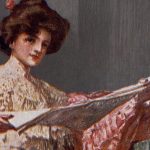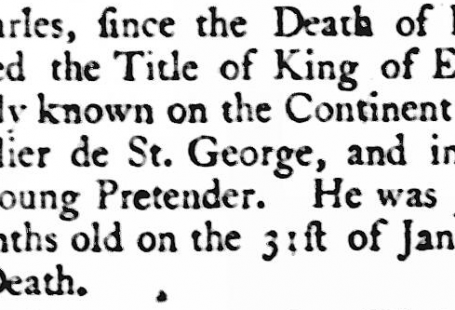In 1870 Ernest ‘Stella’ Boulton and Frederick ‘Fanny’ Park were arrested, charged with ‘conspiring and inciting persons to commit an unnatural offence.’ The case caused a sensation; for, when arrested, Boulton and Park were wearing women’s clothes.
From Bow Street Station to the Van, April 10th, 1870 | The Days’ Doings | 20 May 1871
In this special blog, we take a look at this landmark trial and important chapter in LGBTQ history, and how it was reported at the time in the newspapers to be found on the British Newspaper Archive.
Register now and explore The Archive
Tip: if you’re looking for the report of a trial in our newspapers, it might take place some time after the arrest. For example, Boulton and Park were arrested in April 1870, and their trial was not until May 1871.
The Case for the Prosecution
The trial for Boulton and Park began in May 1871. According to Reynold’s Newspaper the trial was greeted with ‘interest and excitement. The court was densely crowded, and throughout the day the approaches to the court were thronged.’
Birmingham Daily Gazette | 11 May 1871
It was not just Boulton and Park that were on trial, however. Also facing the same conspiracy and incitement charges were Louis Hurt and John Stafford Fiske, the United State’s consul in Leith, Edinburgh. Three more had absconded – Martin Cumming, William Somerville and C.H. Thompson – meanwhile, another had died, the aristocrat Lord Arthur Clinton, whose love-letters to Ernest Boulton had been discovered by law enforcement. Clinton reportedly died from natural causes, but suicide has always been largely suspected.
Although seeking a guilty verdict for ‘conspiring and inciting persons to commit an unnatural offence,’ the prosecution focused mainly on Boulton and Park’s cross-dressing, and brought in a variety of witnesses who had seen them dressed in women’s clothing.
One Henry Holland, a brougham driver, went to Boulton and Park’s residence on the day of the Oxford and Cambridge boat race, 6 April 1870. According to Reynold’s Newspaper, Holland relayed to the court how:
Park came down in female attire, and got into the brougham. He said his sister was not ready. He shortly returned, accompanied with Boulton, who was dressed as a woman…He had no idea at the time that they were men dressed as women.
Boutlon and Park lived for a time at Wakefield Street, where they were lodging when they were arrested. Martha Stacey, their landlady, was another witness for the prosecution:
She saw them all between the Monday and Thursday dressed as women…She never saw any impropriety of conduct. There was not the slightest attempt at concealment that they were in the habit of dressing as women.
Park in ‘Drag’ | The Days’ Doings | 20 May 1871
A further prosecution witness was one Eleanor Coulton, who worked during April 1870 as an attendant in the refreshment room at the Lyceum Theatre:
Three persons came to me in the grand salon on the 27th of April, 1870; two of them were Boulton and Park. Mr Park was dressed in a green, low-necked dress, with a muslin scarf over it. Mr Boulton was dressed in a mauve satin. They asked for a brandy-and-spit soda each, and after that they asked for the ladies-room.
Eleanor Coulton, like Henry Holland, ‘took them for women.’ And all the witnesses concurred; Boulton and Park meant no trouble, they upset no-one, and indeed, nobody really noticed that they were upsetting the status-quo at all.
Further evidence, however, was brought into the courtroom itself in the form of Boulton and Park’s clothing – known even then as ‘drag.’ The Birmingham Daily Gazette reports how the items were held up for inspection, and inevitable ridicule:
…this is Mr Boulton’s chignon, Sir, and back hair – (laughter). Several green, pink, and blue silk dresses, trimmed in the most brilliant colours, muslin dresses also trimmed in a gaudy style, long bunches of yellow hair, several pairs of stays, petticoats, ladies boots, bonnets, hats, found in the lodgings of the defendant by the witness, were placed before the jury. The store seemed exhaustive and the jury cried out that they had seen enough.
The coup de grâce was the alleged relationship between Boulton and Lord Arthur Clinton. Letters between the two expressed certain ‘terms of endearment,’ and meanwhile, one maidservant Maria George alleged that she had heard ‘Lord Arthur Clinton address Boulton as ‘My dear’ and ‘My darling’ several times.’ George had confronted Boulton whilst he was dressed in women’s clothing, accusing him of ‘really’ being a man. Boulton had replied: ‘I’m Lady Clinton.’
The Case for the Defence
The case for the defence was immediately strengthened by the lack of evidence pertaining to the charge, or as the Manchester Evening News reported ‘there was not the slightest proof of any conspiracy or attempted conspiracy with which they were charged. Appearing in women’s clothes in public places were not the offense for which they were being tried.’
Notwithstanding this, the defence presented numerous arguments to prove their clients’ innocence. Chief amongst these was the fact that Boulton and Park were engaged in acting, and dressed in women’s clothes in order to portray female characters. The Manchester Evening News relates how:
Evidence was given to show that in the course of Boulton and Park’s successful theatrical tour in Essex Mr F. Spalding, of Chelmsford, photographed them in the female characters they assumed.
Ernest Boulton | The Days’ Doings | 20 May 1871
Boulton’s mother was also brought in to testify for the defence. Born to respectable parents, Boulton had always ‘showed an inclination to dress in female attire, and to personate feminine characters. He frequently did so and was applauded by all his friends.’ Mrs Boulton further deposed:
...that from the age of six, her son showed a liking for assuming female characters…in later years he assumed the character of a parlour-maid, and waited at table, and the disguise was so perfect, that a friend had said to her, ‘I wonder you keep so flippant a girl about you, having two sons.’
The insinuation here is that Boulton and Park were presenting as women for entertainment purposes, something completely acceptable in the complex web of muddled Victorian morality.
The defence, however, went further to prove that Boulton and Park were physically not guilty of what they were suspected. This makes for uncomfortable reading today, but then was an important linchpin of their case. Several medical experts were called to the stand, including Mr Le Gros Clark, a fellow of the Royal College of Surgeons. According to Reynold’s Newspaper, he reported how:
I found nothing upon Boulton and Park to show that they had committed an unnatural offence, nor could I find anything that would lead to a suspicion that they had been guilty of an unnatural offence.
Frederick Park | The Days’ Doings | 20 May 1871
Aside from these humiliating physical examinations, defence witnesses testified to Boulton and Park’s overall respectability. Mr C.A. Maitland testified that ‘He never saw anything improper in Boulton’s conduct, or he should not have associated with him.’ A Mr Vernon Beale concurred; ‘Boulton’s conduct was unexceptionable.’
Finally, Mr Serjeant Parry, representing Park, addressed the jury. He ‘hoped it might be within the scope of their duty to find a general verdict of not guilty, and relieve the public mind from the oppression that would be caused by an adverse verdict.’
The Verdict
The verdict was delivered by the jury after a lengthy summing-up by the Lord Chief Justice, who, according to the Leamington Spa Courier, spent three hours delivering his charge to them. The Lord Chief Justice appears preoccupied between the defendants’ defiant flouting of accepted moral codes, and the lack of material evidence in their case. Indeed, he encourages the jury to overcome their prejudices towards Boulton and Park in reaching their verdict, as recorded in The Day’s Doings:
…bear in mind most carefully that you are trying the defendants not for the outrage upon public decency, but for a conspiracy to commit felony. And unless you are satisfied of that purpose and conspiracy, no amount of misconduct, however repulsive and however offensive, will justify you in giving a verdict against the defendants on this indictment, whatever may be the fate of the other.
He is severe in his condemnation of the pair – the phrase ‘outrage upon public decency’ is repeated over and over again – but concurs that there was a ‘lawful occasion for the purchase of these dresses.’ Finally, he concludes that ‘there is no evidence of the actual commission of the offence – that is, of any actual incitement to immorality.’
Salisbury and Winchester Journal | 20 May 1871
The jury concurred. After an hour’s deliberation, the jury overcome ‘their indignation at such unmanly proceedings’ to find all four defendants not guilty, with a minor indictment for Boulton and Park for their appearance in public in women’s clothes. This other case was resolved the following month, with Boulton and Park required to ‘enter into their recognisances of £500 each for two years to be of good behaviour.’
Carlisle Patriot | 9 June 1871
Boulton, Park, Hurt and Fiske were acquitted, but at what cost? In the pages of The Days’ Doings it is clear to see the prejudices of the day had not been conquered by the overcoming of a potential miscarriage of justice. The fear that Boulton and Park inspired in their self-expression is clear to see, as one article suggests something of a cover up – ‘All the dark features of the case insensibly melted away, or rather did not put in appearance at all.’
The Days’ Doings blames Boulton and Park’s wealth and connections for their innocence: ‘Had they been poor and friendless, the enormity of the charge might have biased the understandings of simple jurymen against them.’ But the newspaper, ultimately, accepts ‘the verdict of the jury as directed by the Lord Chief Justice.’
And so, Boulton and Park survived having their identities put on trial, and are commemorated by a blue plaque at their former lodgings on Wakefield Street.












